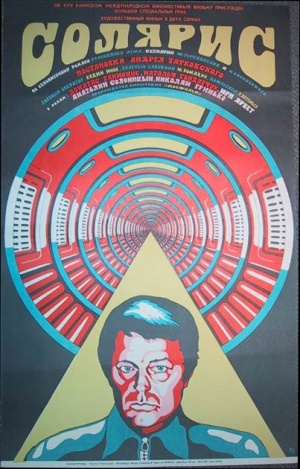Solaris: film 1972
| Solaris | |
|---|---|
 Soviet film poster | |
| Directed by | Andrei Tarkovsky |
| Produced by | Viacheslav Tarasov |
| Written by |
Screenplay: Fridrikh Gorenshtein Andrei Tarkovsky Novel: Stanisław Lem |
| Starring |
Natalya Bondarchuk Donatas Banionis Jüri Järvet Vladislav Dvorzhetsky Nikolai Grinko Anatoly Solonitsyn |
| Music by | Eduard Artemyev |
| Cinematography | Vadim Yusov |
| Editing by | Lyudmila Feiginova |
| Studio | Mosfilm |
| Distributed by | Goodtimes Enterprises |
| Release date(s) |
'France: May 13, 1972 (Cannes Film Festival) USSR: February 5, 1973 |
| Running time | 165 minutes |
| Country | USSR |
| Language | Russia |
| Budget | $1,000,000 (estimated) |
Solaris (Russian: "Солярис") is a 1972 film directed by Andrei Tarkovsky based on Stanislaw Lem's novel Solaris (1961). The meditative psychological drama takes place mostly aboard a space station orbiting a fictional planet.
While Stanislaw Lem's novel deals with the ultimate inadequacy of communication between human and non-human species Tarkovsky's adaptation is a “drama of grief and partial recovery” that concentrates on thoughts and consciences of scientists studying extra-terrestrial life.
Solaris features Natalya Bondarchuk (Hari), Donatas Banionis (Kris Kelvin), Jüri Järvet (Dr Snaut), Vladislav Dvorzhetsky (Henri Burton), Nikolai Grinko (Kris Kelvin’s Father), Olga Barnet (Kris Kelvin’s Mother), Anatoli Solonitsyn (Dr Sartorius), and Sos Sargsyan (Dr Gibarian); the music score was composed by Eduard Artemyev. At the 1972 Cannes Film Festival the film won the Grand Prix Spécial du Jury, the FIPRESCI prize and was nominated for the Palme d'Or.
During making of the film, Tarkovsky loosely colaborated with Lem himself. This had however quickly ended, as Lem was dissatisfied with the direction Tarkovsky was taking, notably slight changes in plot line, such as introducing Kelvin's family (As Lem famously said: "He put Kelvin's aunt in there! And he wanted to put his grandmother!"). On the other hand, Tarkovsky claimed his concept required better characteristics of Kelvin's background. Tarkovsky also complained, and actually until his death (in 1986) he claimed "Solaris" to be his worst film.
Tarkovsky's idea was to abstract ideas from "Solaris" and place the plot somewhere else (to the extent of filming it without any mention of space travel), whereas Lem wanted to follow his book.
The movie contains famous, several minutes long sequence of car travel, filmed in Japan. This material, meant to "scare ignorants out of the cinema" (in Tarkovsky's words), was filmed independently and included in final cut along with footage of one of characters. There are also other cultural references (for which Tarkovsky was renowned) such as usage of classical music, or including a reproduction of Peter Bruegel's painting "Hunters on the Snow".